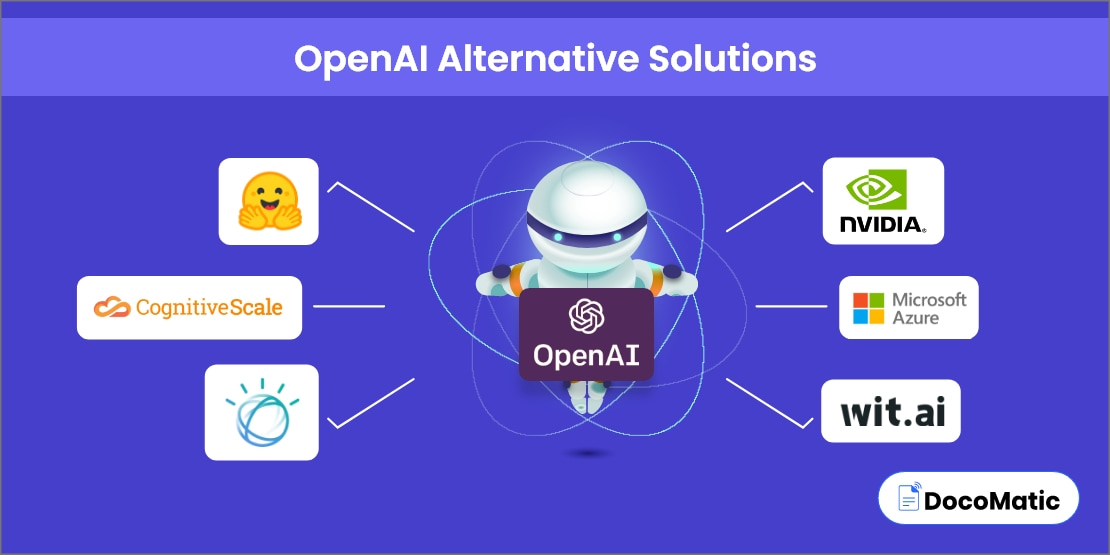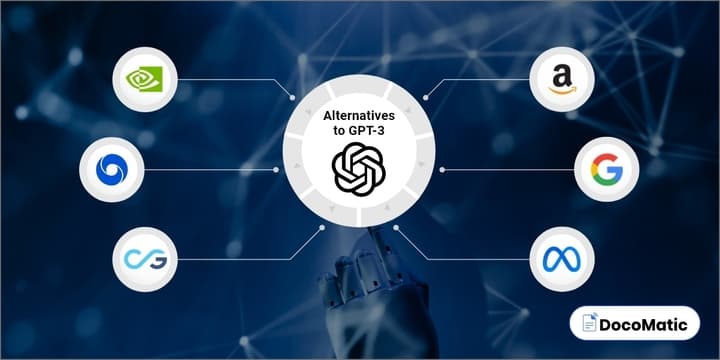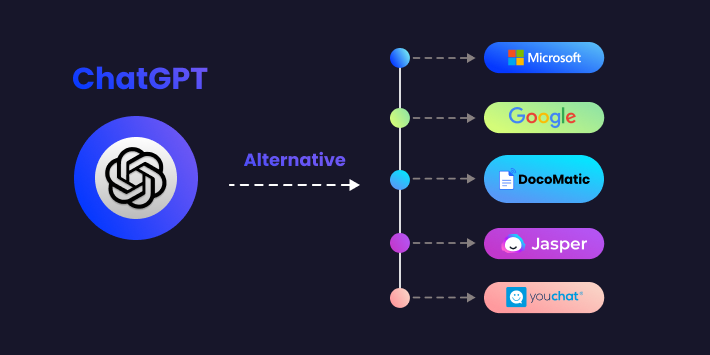In the last few years, Artificial Intelligence has taken over all major industries and has started revolutionizing them. OpenAI is one such miracle in the world of AI. It was founded in 2015 by some well-known AI enthusiasts, including Elon Musk, Sam Altman, Greg Brockman, Ilya Sutskever, John Schulman, and Wojciech Zaremba with a sole vision of ensuring that it benefits humanity as a whole.
With the increasing hype of OpenAI, some questions have arisen, like is OpenAI the only player in the AI market? Can OpenAI beat Google in terms of market share? Are there any alternatives to OpenAI? In this blog, you will find the answer to the most asked question, “Are there any alternatives to OpenAI?”. You will find a detailed guide on the top 7 OpenAI alternative solutions along with their features, pros, cons, and pricing plans.
Table of Content
Reasons You Need OpenAI Alternatives
Despite getting millions of users in a short span, OpenAI falls behind due to some reasons. Here, we have listed 3 major reasons that push users to look out for OpenAI alternatives.
- Customization
OpenAI is a pre-trained model, it can only behave or generate output the way it is trained. So, you cannot use it for the customized use of your own or your organization. This is a major setback for the users who are willing to modify or customize OpenAI for their specific needs. It is when a need comes up to switch to a different model other than ChatGPT that allows users to customize the model.
- Cost
OpenAI could be expensive for many people. Developers or business owners who are new in the business are often short of capital, so not everyone can afford to pay for all the models of OpenAI. In such cases, they prefer other models that have less price or no price at all.
- Centralized platform
OpenAI being a centralized platform, its users have to store data in third-party servers. Due to this reason, some users get concerned about data privacy and security. If the data gets stored in third-party servers, there is always a potential risk of data breaches or even unauthorized access.
This could be a challenge for businesses or organizations having sensitive or confidential data. So, the need of finding another AI model in place of OpenAI arises.
Top 7 OpenAI Alternatives
Considering various factors like features, user compatibility, and use cases, we have brewed 10 alternatives to OpenAI that you can consider for yourself, your business, or your organization.
1. Hugging Face
Hugging Face is a well-known open-source library for Natural Language Processing (NLP). It enables developers to build chatbots and voice assistants. Hugging Face offers pre-trained models that can be used to build pre-trained interfaces. Being an easy-to-use tool, Hugging Face supports various languages such as English, Spanish, German, and French.
Features of Hugging Face
- NLP-focused Artificial Intelligence (AI) platform
- Pre-trained models for a wide range of language tasks
- User-friendly API
- Community support and resources
2. IBM Watson
IBM Watson provides various AI tools and services. It helps developers to build AI-powered applications in various domains, including finance, retail, and healthcare. One of the key benefits of using IBM Watson is that it is highly customizable. Also, it provides top-notch data security, so you need not worry about data breaches anymore. IBM Watson is a perfect choice for custom model development and deployment.
Features of IBM Watson
- Range of AI tools and services for high-quality content
- Pre-trained models and APIs
- Customizable and scalable
- Enterprise-grade security and privacy
3. Google Cloud AI Platform
Google Cloud AI based Platform is a suite of various AI tools and services that allows developers to develop and deploy artificial Intelligence models. It has a range of development tools, including TensorFlow and PyTorch. Along with this, the Google Cloud AI based Platform has pre-trained models and APIs for image and text analysis. Overall, the Google Cloud AI based Platform is a considerable AI model when looking for OpenAI alternatives.
Features of Google Cloud AI Based Platform
- Comprehensive AI-based platform
- Pre-trained models and APIs
- Development tools for TensorFlow and PyTorch
- Integrations with other Google Cloud services
4. Microsoft Azure AI
Microsoft Azure AI is a machine learning platform comprised of AI-powered tools and services. It has pre-built APIs for speech recognition and image. Also, it provides you with various machine learning tools for developing, training, and deploying AI custom models.
Features of Microsoft Azure AI
- Various Machine learning tools
- Comprehensive AI-based platform
- Pre-built AI-based models and APIs
- Development tools for TensorFlow and PyTorch
- Integrations with other Microsoft Azure services
5. NVIDIA
NVIDIA deep learning is a well-known technology company specializing in manufacturing Graphics Processing Units (GPUs). Because of its high processing power, its GPUs are widely used in AI research, development, and data analysis. To ease AI development for developers, NVIDIA deep learning provides AI libraries and tools. CUDA and cuDNN are some of their AI libraries.
Features of NVIDIA
- AI tools and libraries for GPU computing
- Support for popular frameworks like TensorFlow and PyTorch
- Access to pre-built models and resources
- Developer community and forums
6. CognitiveScale
CognitiveScale helps businesses to make better decisions and customer experiences by leveraging AI and machine learning. Its pre-built APIs make integration easy. Its wide range of development tools makes it easy for developers to customize and deploy a machine learning AI model. One of the promising features is its enterprise-grade security that ensures the sensitive data is protected and you remain worry-free.
Features of CognitiveScale
- AI-based platform for enterprise applications
- Pre-built models and APIs for NLP and computer vision
- Tools for customizing and deploying models
- Enterprise-grade security and compliance
7. Wit.ai
Wit.ai is one of the proficient Natural Language understanding platform among other Natural Language Processing models that enables developers to create various AI models like chatbots and virtual assistants. It supports various programming languages like Python, Ruby, and Node.js. Also, it has got APIs for easy integration with other systems in just a few clicks. Developers can easily build conversational interfaces using Wit.ai that can understand and carry out Natural Language Processing tasks.
Features of Wit.ai
- NLP-focused platform for conversational interfaces
- User-friendly interface for model training
- Supports multiple languages
- Owned by Facebook
Pros and Cons of Alternatives
We have listed the pros and cons of each option to OpenAI to get you a better understanding of all the 7 alternatives discussed in the blog.
| Open AI Alternative | Pros | Cons |
|---|---|---|
| Hugging Face |
|
|
| IBM Watson |
|
|
| Google Cloud AI-based Platform |
|
|
| Microsoft Azure AI |
|
|
| NVIDIA |
|
|
| CognitiveScale |
|
|
| Wait.ai |
|
|
Also, check out the pros and cons of OpenAI to get a clarity of choosing the right AI platform that is suitable for your needs.
FAQs
It is very crucial to choose a specific option for OpenAI from all the available options. One of the key considerations is specific features you or your business needs, customization options, pricing, data security, data encryption system used, and the level of customer support.
Do check out our blog if you want more information on different OpenAI software available in the market.
DL models are a subclass of artificial neural networks that can learn and make choices in a manner analogous to that of humans. These models have the ability to automatically identify complicated characteristics and patterns from vast volumes of data.
Layers of linked nodes that work together to analyze the incoming data hierarchically are used to build DL models. The ultimate output of the model is a prediction or judgment based on the more sophisticated information that each layer of nodes pulls from the input data.
Yes, every option to OpenAI comes with some unique features that are beneficial to some specific industries or businesses only. It solely depends on the niche of your business, your usability, the features you need, and the price you are ready to pay.
Although every alternative can be used by any industry, if research is done properly, you might get an alternative whose features incline directly with your business needs.
Conclusion
If we look at the zoomed-out view of the current AI market scenario, there are many OpenAI alternatives available. Each differs in terms of features, pricing, expertise, capabilities, use cases, and customer experience. From machine learning to computer vision, these platforms have a wide range of capabilities.
Using these platforms, you can leverage AI to improve decision making, custom application development, enhance customer experience, improve operations, and train & deploy AI-based models. So, whether you are a developer, business, or organization looking to make the most use of AI but not OpenAI, these are the alternatives available in the market.


